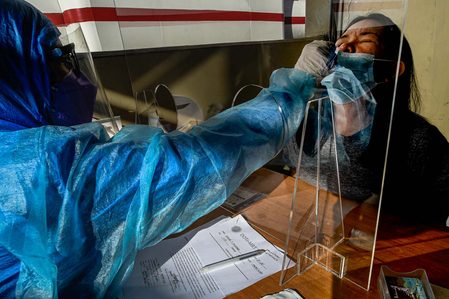SUMMARY
This is AI generated summarization, which may have errors. For context, always refer to the full article.
![[OPINION] It’s 2 years into the pandemic, and we still don’t have mass testing](https://www.rappler.com/tachyon/2022/02/mass-testing-february-2-2022.jpg)
On January 30, 2020, the government announced that COVID had finally reached our shores. Two years have come and gone, and we still don’t have mass testing.
In a recent interview, DOH Undersecretary Rosario Vergeire reiterated that the government will remain steadfast in its position to not implement mass testing amidst the sharp spike in COVID cases after the holidays. Usec. Vergeire said mass testing “is not rational and scientific,” according to government experts. But the statement was slammed by public health organizations and decrying the government’s blatant dereliction of duty.
According to UK’s Task and Finish Group on Mass Screening (TFMS), mass testing, or population-level case detection “refers to regular and/or large-scale testing of whole populations defined by area or sector regardless of whether or not they have symptoms…(and) involves pro-active asymptomatic testing of a defined group; either through universal provision of accessible testing to that group or as a requirement before entering a particular setting.” This means the government actively seeks a targeted portion of the population to determine pools of high viral transmission and COVID hotspots across the country, transecting social identifiers such as age, sex, gender, education etc.
Now, let’s expound on Usec. Vergeire’s statement. There are two operating terms in her statement: rational and scientific. If we go about searching online, Merriam Webster yields us very clear definitions – rational is defined as “based on facts” and “having the ability to reason or think clearly” while scientific means “of, relating to, or exhibiting the methods or principles of science” and “conducted in the manner of science or according to results of investigation by science: practicing or using thorough or systematic methods.”
Now, let’s apply these definitions to Usec. Vergeire’s statement. She said mass testing isn’t rational, which, going by the Merriam Webster’s, mass testing isn’t based on facts, and by extension won’t provide the ability to reason or think clearly. But World Health Organization Director-General Tedros Ghebreyesus said that without mass testing, governments would be combatting the virus like fighting a fire in blindfold. In 2020, during the first outbreak, South Korea, Taiwan, and Singapore, countries that have experienced the MERS-COV epidemic, implemented a mass testing policy to determine locations of virus spread and establish solid database of infected populations. The datasets generated in the mass testing provided evidence to support public health and local economy policies such as lockdowns and aid to MSMEs. And before the second and third waves of viral spread and the subsequent mutations, South Korea and Taiwan were hailed as countries with best practices in containing the virus.
Usec. Vergeire also stressed that mass testing isn’t scientific. In 2020, Slovakia launched a mass testing program, first in Europe, “to determine people who were most infectious… with high viral load… and greatest epidemiological risk” (Jarčuška, as cited by Burki, 2020). Cognizant of the false positive rate, the Slovakian government was able to determine locations with high disease prevalence which were therefore required to adhere to stringent lockdown measures. The Slovakian government was also able to monitor the waves of infection and informed their policies on mobility and travel.
In a country still grappling with debts incurred from decades ago, the Philippines is forced to work with limited fiscal space, which renders prioritization as paramount. Apart from the horrible drug war, hard infrastructure has been the banner call for development of this administration. And the foreseen impacts include employment and boosted investor confidence.
But in the midst of the pandemic, prioritization harkens a different mindset. Human resource and development require substantial nurturing and sustenance. And the pandemic has confronted our fragile human development systems such as education. It also questioned the already questionable budget prioritization on NTF-ELCAC. In a time where the adversary is million times smaller than a bullet, why would you inject billions of pesos on anti-communist activities instead of building soft and hard infrastructure for public health?
The compelling part about the rationality and scientific merits of mass testing isn’t the process of implementing the mass testing itself, largely because mass testing requires resources, both fiscal and personnel. No. It’s the pay-off, the working datasets, the larger picture afforded by the sampling generated through the mass testing that support the rationality of doing it; the skills that could have learned by BHERT in handling epidemic and highly contagious health cases; the hard infrastructure such as equipment, testing centers, and vaccine technology we could have developed as part of our national armory should there be another pandemic. The payoffs would have been enormous if only the government had treated mass testing as a rational and scientific methodology in gathering data for evidence-based public health policies. But as mentioned by Usec. Vergeire before, they do not see it as such.
We’re running behind. So far behind. In managing a global pandemic, all nations should be keeping up. We’ve seen this film before, and we didn’t like how it ended. I hope 2022 becomes lighter for all of us. – Rappler.com
Kaye Bagas is a mom of three misfits and is currently struggling with her masters degree.
Add a comment
How does this make you feel?

![[ANALYSIS] Dapat ilibre na ng gobyerno ang COVID tests](https://www.rappler.com/tachyon/2022/01/government-covid-tests.jpeg?fit=449%2C449)
![[VIDEO EDITORIAL] Hindi raw rational ang mass testing, sabi ng DOH. Tigilan na ang palusot.](https://i.ytimg.com/vi/HdY2V7L-2a4/hqdefault.jpg)
There are no comments yet. Add your comment to start the conversation.